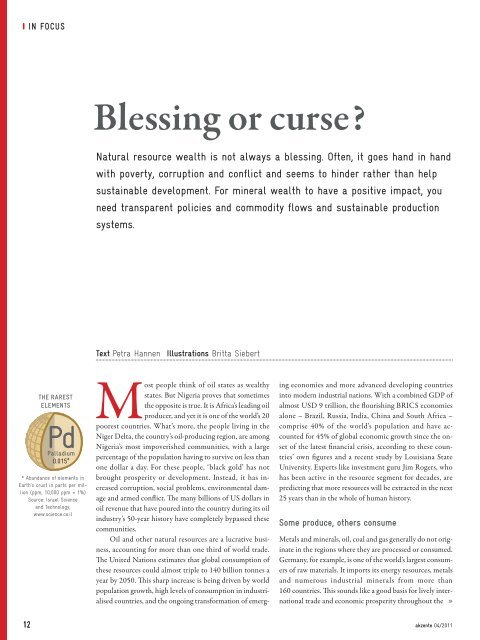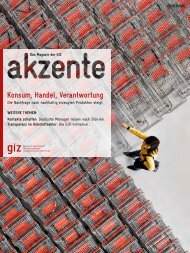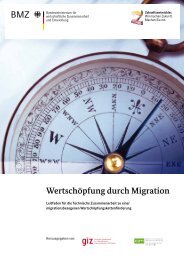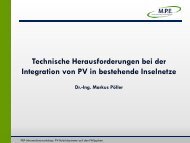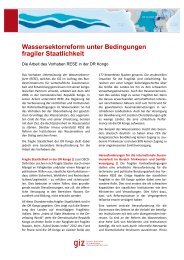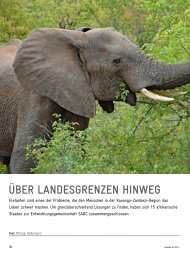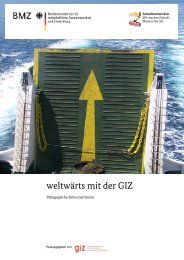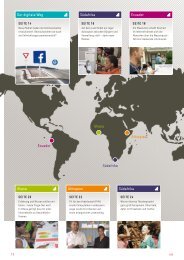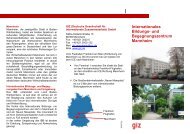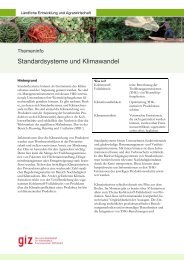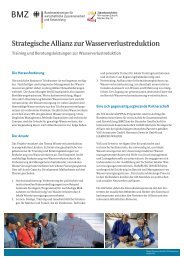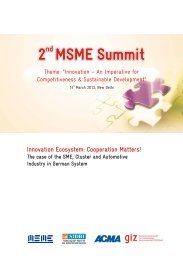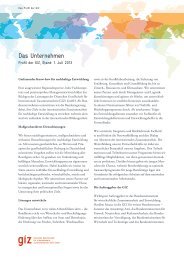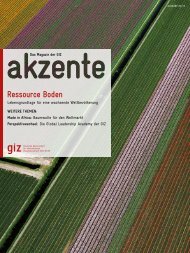Complete issue (pdf, 7520.08 MB, EN) - GIZ
Complete issue (pdf, 7520.08 MB, EN) - GIZ
Complete issue (pdf, 7520.08 MB, EN) - GIZ
You also want an ePaper? Increase the reach of your titles
YUMPU automatically turns print PDFs into web optimized ePapers that Google loves.
IN FOCUS<br />
The rareST<br />
elemeNTS<br />
Pd<br />
Palladium<br />
0.015 *<br />
* Abundance of elements in<br />
Earth’s crust in parts per million<br />
(ppm, 10,000 ppm = 1%)<br />
Source: Israel Science<br />
and Technology,<br />
www.science.co.il<br />
Blessing or curse?<br />
Natural resource wealth is not always a blessing. Often, it goes hand in hand<br />
with poverty, corruption and conflict and seems to hinder rather than help<br />
sustainable development. For mineral wealth to have a positive impact, you<br />
need transparent policies and commodity flows and sustainable production<br />
systems.<br />
Text Petra Hannen Illustrations Britta Siebert<br />
Most people think of oil states as wealthy<br />
states. But Nigeria proves that sometimes<br />
the opposite is true. It is Africa’s leading oil<br />
producer, and yet it is one of the world’s 20<br />
poorest countries. What’s more, the people living in the<br />
Niger Delta, the country’s oil-producing region, are among<br />
Nigeria’s most impoverished communities, with a large<br />
percentage of the population having to survive on less than<br />
one dollar a day. For these people, ‘black gold’ has not<br />
brought prosperity or development. Instead, it has increased<br />
corruption, social problems, environmental damage<br />
and armed conflict. The many billions of US dollars in<br />
oil revenue that have poured into the country during its oil<br />
industry’s 50-year history have completely bypassed these<br />
communities.<br />
Oil and other natural resources are a lucrative business,<br />
accounting for more than one third of world trade.<br />
The United Nations estimates that global consumption of<br />
these resources could almost triple to 140 billion tonnes a<br />
year by 2050. This sharp increase is being driven by world<br />
population growth, high levels of consumption in industrialised<br />
countries, and the ongoing transformation of emerg-<br />
ing economies and more advanced developing countries<br />
into modern industrial nations. With a combined GDP of<br />
almost USD 9 trillion, the flourishing BRICS economies<br />
alone – Brazil, Russia, India, China and South Africa –<br />
comprise 40% of the world’s population and have accounted<br />
for 45% of global economic growth since the onset<br />
of the latest financial crisis, according to these countries’<br />
own figures and a recent study by Louisiana State<br />
University. Experts like investment guru Jim Rogers, who<br />
has been active in the resource segment for decades, are<br />
predicting that more resources will be extracted in the next<br />
25 years than in the whole of human history.<br />
Some produce, others consume<br />
Metals and minerals, oil, coal and gas generally do not originate<br />
in the regions where they are processed or consumed.<br />
Germany, for example, is one of the world’s largest consumers<br />
of raw materials. It imports its energy resources, metals<br />
and numerous industrial minerals from more than<br />
160 countries. This sounds like a good basis for lively international<br />
trade and economic prosperity throughout the »<br />
12<br />
akzente 04/2011


